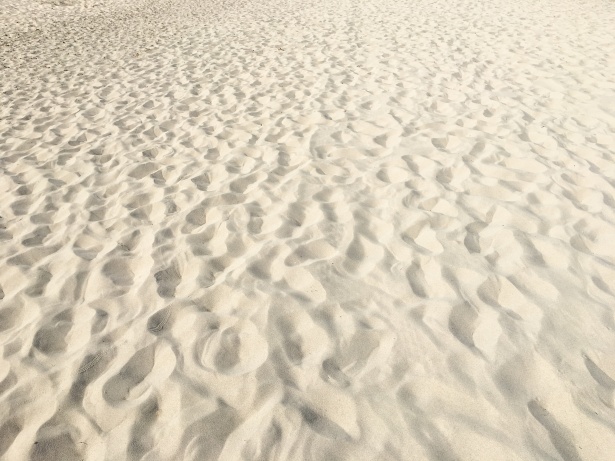An island is a space of desire. I sensed this immediately, but I wouldn’t have been able to articulate the idea as a child. The first time I visited Isla Margarita, I felt disoriented: the heat followed me everywhere, nudged its snout into my armpits, between my legs, panted at the nape of my neck like a big slumbering dog. I sweated profusely. The passing breeze offered no comfort; it was made of dead leaves.
But what most confused me was the ocean. It didn’t resemble the one I saw when my parents took me to the harbor at La Guaira, in Venezuela. We’d look out at the water make our way home. But there was no returning from the sea I encountered later. Yes, they had the same name, but they were different. When I pronounced it on Margarita, my mouth filled with a rough honey.
∞
The water surrounded us like an invitation or a threat. Or like neither one, really, but something else. Like what I’ve got embedded in my memory: an astonishment. That. It encircled us, besieged us with the certainty of awe.
∞
The vegetation on Margarita was dejected. I remember it as brick-colored, dusty, as if the entire island were made of dark flour ground by the day’s glare.
Its scorchedness was almost affectionate. It had scrawny, hungry trees, tenacious bushes in diligent contortions, cacti. Inland, the soil was knotty. Dazzled earth where the Caribbean flashed its blue blade on every corner.
∞
On the shore, bathers emerged from the waves with the water snapping at their heels. Countless teeth of foam.
Some played with beach balls; others sunned themselves or chatted. Still others stretched out and let sleep have its way with them. Slumberers all lined up on the sand, bright as lamps, with their lustrous, smoldering skin, sprawled and oily enough to trap the light.
∞
For years, I thought that sand could only be white, crudely white, faded, an endless procession of parched grains. When I set foot on a beach of volcanic sand for the first time, I felt like I was stepping on a cauterized wound.
An electron micrograph of a few grains of sand looks like an image captured by a powerful telescope: gray, uneven bodies, interminably distant, lost to the darkness.
It would take me a long time to grasp the overwhelming variability of sand: how it’s made of materials as diverse as quartz, silica, limestone, and plaster, and also by the crushed remains of prehistoric fossils, creatures that time crumbled minutely between its blind jaws.
∞
Until then, I hadn’t known such stillness, that simple being-there, the way the body lingered in itself, in its own reserves of reddened flesh and tender bones, with neither allegiances nor debts, released: a body among bodies.
I harbored all the freedom that my eight years on earth could bear. I walked to the beach, played with other children, let night fall unhurried; let the taste, color, texture of a dense, ripe mango take shape overhead.
∞
Nights were solid on Margarita. They expressed their weight in the ceiling, in the white walls of the house where we stayed. They kept me from sleeping: they called out insistently from the doorway, panting and scratching at the wood. With the lights out, lying in bed, the window clouded up from all my looking.
I’d sleep naked and unblanketed, the dark condensed around me like another skin on my skin. Desire made me impatient, but I didn’t know what I was waiting for. Porous night, brusque matter.
∞
Adalber Salas Hernández was born in Caracas. A poet, essayist, and translator, he is the author of seven collections of poetry, including La ciencia de las despedidas, published in 2018 by Pre-Textos (Spain). Other poems from the same collection, also in Robin Myers’s English translation, have appeared in the Kenyon Review, the Harvard Review, Waxwing, and AMP. He has published two collections of essays, as well as numerous translations from English and French–among them, translations of Lorna Goodison, Patrick Chamoiseau, and Nicholas Laughlin. He has been a member of the editorial board for Revista POESÍA and Buenos Aires Poetry. He coordinates the collection Diablos Danzantes published by Amargord Ediciones.
Robin Myers is a Mexico City-based poet and translator. She was among the winners of the 2019 Poems in Translation Contest, held by Words Without Borders and the Academy of American Poets. Her translations have appeared in The Common, the Kenyon Review, the Harvard Review, Words Without Borders, Two Lines, The Offing, Waxwing, Beloit Poetry Journal, Asymptote, the Los Angeles Review of Books, Tupelo Quarterly, and elsewhere. Recent book-length translations include Lyric Poetry Is Dead by Ezequiel Zaidenwerg (Cardboard House Press), Animals at the End of the World by Gloria Susana Esquivel (University of Texas Press), Cars on Fire by Mónica Ramón Ríos (Open Letter Books), and The Restless Dead by Cristina Rivera Garza (Vanderbilt University Press).
